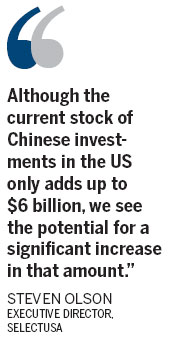Chinese investment in US set to 'double'
Updated: 2012-06-24 07:23
By Wei Tian in Nanjing (China Daily)
|
||||||||
Companies from two nations sign contracts worth $3.4b at forum
Chinese investment in the United States is likely to double soon thanks to lower costs and more local incentives, a US official said on the weekend.
"Although the current stock of Chinese investments in the US only adds up to $6 billion, we see the potential for a significant increase in that amount," said Steven Olson, executive director of SelectUSA, a program under the US Department of Commerce aimed at attracting foreign investment.
He made the remarks on the sidelines of the second US-China Cities Forum on Economic Cooperation and Investment that concluded on Saturday in Nanjing, capital of East China's Jiangsu province.
 |
The contracts include four Chinese companies' investment in the US totaling $70 million, according to the Ministry of Finance.
Olson said he expected Chinese investment in the US to double in "a relatively short period of time", adding that the goal is "possible" considering the current growth rate.
He said China is the fastest growing source of foreign investment in the US. The country's direct investment in the US grew at an average annual rate of 53 percent from 2005 to 2010.
According to the Ministry of Commerce, China was the fifth-largest investor globally in 2010, with outbound direct investment of $68.8 billion. But growth in investment in the US, at 44 percent, was much slower than that in Europe (101 percent) or Japan (302 percent).
Finance Minister Xie Xuren said on Saturday that cooperation between China and the US at the local level has become a key driving force of bilateral economic ties.
Xie said at the forum that as cities in China and the US are at different stages of development, they have "strong complementarities".
The Chinese government wants to develop industries with comparative advantages, while the US government hopes to expand its exports and revitalize the manufacturing industry, which allows much room for bilateral cooperation, Xie said.
Recovering from the economic crisis, the US now has relatively lower energy prices and a productive workforce.
According to Olson, Chinese investors are involved in many sectors in the US, including green energy, electronics, communications, industrial machinery, software and IT services, as well as business and financial services.
His office is working with several other organizations on a project to mark the positions of industrial clusters in the US in order to make it easier for potential investors to identify their destinations.
Unlike China, where incentive programs for foreign investors are mainly initiated by the central government, central and local authorities in the US are responsible for drafting these policies.
"To increase the economic relationship with China has been the focus area in many cities and states in the US," said Scott Smith, vice-president of the US Conference of Mayors and the mayor of Mesa, Arizona.
The US real estate sector has also received a significant contribution from Chinese investors as China maintains tightening measures on its domestic housing market.
Chinese buyers have spent $9 billion on properties in the US, accounting for 11 percent of the total foreign spending - only second to Canadians, who have spent $19.8 billion, according to the US National Association of Realtors.
But "Chinese investors have been careful and cautious in their investment in the United States, and they have been benefiting from that attitude," Olson said.
Although he insisted there isn't any difference in policies regarding ownership, Olson said the US welcomes more small- and medium-sized enterprises as well as entrepreneurial investors from the world's second-largest economy.
However, experts reminded Chinese businesses that they should be aware of potential risks when investing in the US.
Such risks include economic uncertainties, the depreciation of the dollar against the renminbi and possible bias against Chinese companies, according to Zheng Xinli, vice-chairman of the China Center for International Economic Exchanges.
weitian@chinadaily.com.cn

 Relief reaches isolated village
Relief reaches isolated village
 Rainfall poses new threats to quake-hit region
Rainfall poses new threats to quake-hit region
 Funerals begin for Boston bombing victims
Funerals begin for Boston bombing victims
 Quake takeaway from China's Air Force
Quake takeaway from China's Air Force
 Obama celebrates young inventors at science fair
Obama celebrates young inventors at science fair
 Earth Day marked around the world
Earth Day marked around the world
 Volunteer team helping students find sense of normalcy
Volunteer team helping students find sense of normalcy
 Ethnic groups quick to join rescue efforts
Ethnic groups quick to join rescue efforts
Most Viewed
Editor's Picks

|

|

|

|

|

|
Today's Top News
Health new priority for quake zone
Xi meets US top military officer
Japan's boats driven out of Diaoyu
China mulls online shopping legislation
Bird flu death toll rises to 22
Putin appoints new ambassador to China
Japanese ships blocked from Diaoyu Islands
Inspired by Guan, more Chinese pick up golf
US Weekly

|

|






